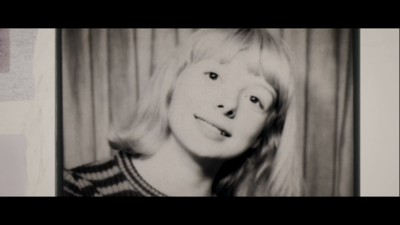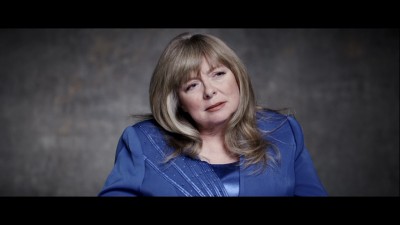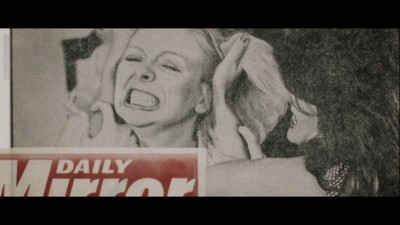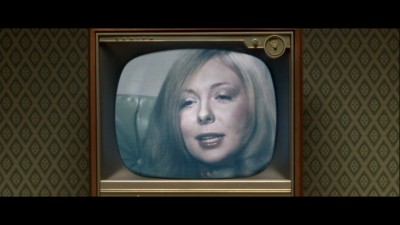| Reviews & Columns |
|
Reviews DVD TV on DVD Blu-ray 4K UHD International DVDs In Theaters Reviews by Studio Video Games Features Collector Series DVDs Easter Egg Database Interviews DVD Talk Radio Feature Articles Columns Anime Talk DVD Savant Horror DVDs The M.O.D. Squad Art House HD Talk Silent DVD
|
DVD Talk Forum |
|
|
| Resources |
|
DVD Price Search Customer Service #'s RCE Info Links |
|
Columns
|
|
|
Tabloid

Joyce McKinney is a character, both in the sense of being an eccentric, attention-grabbing personality and now, thanks to Errol Morris's latest documentary, Tabloid, in the cinematic sense as well. McKinney, a beauty queen from Wyoming, was briefly at the center of a UK tabloid feeding frenzy in the late '70s, when she was arrested and imprisoned for a bizarre encounter with the man she was engaged to at the time--an encounter that had the appearance of a crime, and one whose series of events we hear several different versions of throughout the film. We may never actually know the objective, verifiable truth of what happened, but it is not getting to that truth that Tabloid concerns itself with so much as contemplating what happens when stories are told and sold to a consuming public, by whom, and why.

Morris (whose The Fog of War won an Oscar for best documentary) structures his explanatory, cartoon-like graphics, montages of press clippings, and archival footage around a present-day interview with McKinney, who recounts her version of the story as concurrent, intercut testimony from others who were around for her imprisonment and scandalous moment in the spotlight--an accomplice, a tabloid journalist, a photographer--offer a version significantly less flattering to her and her sense of being the wronged good guy. What we do know is that, as a self-described "all-American" young woman and Miss Wyoming in the mid-'70s, McKinney became infatuated with a man called Kirk Anderson, a devout Mormon who drove a Corvette. (This is how they met and bonded--both loved their Corvettes.) They fell head over heels for each other, got engaged, and Joyce was in ecstasy because she would become an inhabitant of the American Dream, with a white picket fence and lots of her husband's babies in her tummy (her words). That dream was threatened, however, when Anderson just disappeared without a trace. When McKinney discovered that he had gone to England on his obligatory mission as a young Mormon man, she went into ultra-proactive (and, it must be said, anti-Mormon--she disparages that "cult" repeatedly) mode, moving to L.A. to earn enough money to hire a private detective, bodyguards, and a small aircraft to go rescue her man, whom she believed to have been kidnapped. She eventually tracked Anderson down outside a temple in London and, depending on whose version you believe, either persuaded, coerced, or forced (with a fake gun or even chloroform) to come with her. Shortly thereafter, she took him to a remote cottage to hole up for a few days, during which time she put him through a "honeymoon"/deprogramming regimen that involved--again, depending on whose story you listen to--McKinney's bondage and rape of the devout, virginal (and, by all accounts, stocky, awkward, and not worth obsessing over) Anderson, or her freeing him from the cruel sexual guilt and inhibition inflicted by strict Mormon mores. (Cue an ex-Mormon gay activist to explain the Church of Latter-Day Saints's notoriously ultra-dogmatic, high-pressure culture when it comes to sex and sexuality. Also cue the animated Mormon teaching videos we last saw used as cheesy objects of ridicule in Larry Charles and Bill Maher's Religulous.)

A private tug-of-war over Anderson between McKinney and the Mormon church resulted in McKinney's arrest, imprisonment, and stardom courtesy the notorious British tabloid press, who promptly went snooping around McKinney's old L.A. stomping grounds, where they discovered that the "modeling" work that this eyelid-batting good girl with the angelic visage and gorgeous figure did to fund her rescue mission seemed to have involved S&M/nude photo shoots, "massage" and kinky play for hire advertised in the back of free Hollywood newspapers, and even some activities that could be considered prostitution. McKinney claims that the numerous photos Morris shows us were doctored (which seems very unlikely), while the tabloid journalist and photographer interviewed by Morris assert that McKinney was an insane, trouble-seeking spotlight hog who loved the attention. Meanwhile, McKinney and the mysterious male friend she brought along with her (who died in 2004) courted the British tabloids and TV after she got out on bail, showing up everywhere in ludicrous disguises to be photographed, looking for all the world like they were having the adventure of a lifetime, until they finally fled, "cleverly" disguised as deaf-mutes (it did work, after all), to Canada. What McKinney and Morris offer by way of accounting for the intervening years between her escape and his interview with her shows her multiple attempts at a second act (hint: she would not have been at all out of place as a character in Best in Show) to be equally, willfully odd and slyly publicity-seeking, despite her disingenuous protests to the contrary.

All kinds of evidence that might persuade us of one or another version's veracity has been conveniently stolen, lost, or otherwise vanished into thin air, so most of what we have to go on is, finally, McKinney's testimony to Morris, in which she does--despite her overdemonstrative, syrupy-flirtatious, sometimes-imperious/sometimes-pathetic, but always extreme behavior that might lead one to take anything she said with a big grain of salt--give very decisive evidence of one thing, with both her words and her actions: She loves to perform, loves to cast herself as the victim/heroine at the center of a most unlikely, gaudy, thrill-a-minute narrative. Though it's obviously not what she means when she employs the phrase, these sometimes charming, more often disturbing attributes may be a truer, more alarming attestation to the idea that Joyce McKinney really is an "all-American" girl.
The tone of Morris's approach to all this is something like John Waters's (Serial Mom) to his freakish characters: nonjudgmental yet unsentimental, affectionate, even celebratory. But Morris isn't, like Waters, defiantly casting outsider-actors who would normally be excluded; he seems to have chosen as a subject somebody who aspires to be as straight and "normal" as they come but enjoys whatever kind of attention she can get (whether respectful, like Morris's, or exploitative, as in the case of the tabloids). It is ultimately Morris's lightness of touch and respect for McKinney that make Tabloid something other than reality-TV gloating over the shamelessness and lack of insight displayed by the figure onscreen, but his style here--the goofy graphics, the overemphatic editing--while it protects McKinney from an automatically condemnatory view, also limits one's ability to see her as anything but her exterior; for all the confession and exposure it contains, Tabloid is a somewhat superficial, unrevealing movie. (I find that Morris's style, with its elaborate set-ups, prettily lit interview shots, and scoring and editing techniques, often flirts with slickness, and he takes that even further here than in most of his other films.) The closest we get to McKinney is when we're offered a tantalizing glimpse of some home video footage she shot in 1986 of the backyard and environs of her parents' house, where she was eventually reduced to living after her brush with ignominy. She appears to be whiling away her deliberately isolated, lonely, celibate days (she claims she will never love anyone but Anderson, who remains a Mormon, married and had a family with someone else, and refused to be interviewed for the film) cataloging the relentless barking of a neighbor dog as evidence that it's a nuisance keeping her from writing her promised, long-delayed tell-all book. Those intimate, obsessive, embarrassing, sad moments that show how lost McKinney was are the real heart of Tabloid, and although that heart is big enough to rescue the film from a kind of cynicism, it's too small to take Tabloid from being a smart, funny, observant look at what tends to get noticed in our culture and the price paid for that to a level of resonance or excellence that it might have reached by giving us a little more of that vulnerable, desperate Joyce McKinney that she expends so much entertaining, amusing effort to make us (and, one guesses, herself) forget.

THE DVD:
The 2.40:1 aspect ratio, anamorphic transfer to DVD is excellent. Whatever aesthetic limitations it might bring along with it, Errol Morris's films (other than interpolated found/archival footage from other sources) have a visual sensibility, manifested here by DP Robert Chappell, that is unusual in the documentary field for being so well-crafted (again, not automatically a benefit to the film, but it looks nice). Skin tones are important in a work with so much talking-head footage, and that element looks near-perfect here, with no mottling or other image degradation. All lighting, color, and contrast remain true and free of aliasing, image combing, or any other compression artifacting.
Sound:Morris and co. create an unusually elaborate (for documentary) sound design to go along with the film's unusually clean and vibrant images, and the disc's Dolby Digital 5.1 surround soundtrack conveys the fullness and sonorousness of John Kusiak's score and the exceptionally well-recorded interviews as an immersive experience not often associated with this kind of film.
Extras:Nothing aside from the film's theatrical trailer.
FINAL THOUGHTS:Tabloid is a fine, intriguing, often very funny look at an eccentric, truly "all-American" girl who found that those "all-American" values--fame, fortune, romance, ambitious self-invention, stability, hearth, home, love, marriage, beauty-contest sexuality and puritanism--can make for a very confusing and contradictory set of marks to hit. But while the film does, wisely, let us see clearly the cycle of received, presumed-normal values and goals working in tandem with a voyeuristic, voracious media/publicity machine into which this woman all too willingly tumbled, it falls somewhat short in its consideration of its strangely charismatic subject when it comes to her being an individual human being who has her emotional and psychological needs wrapped up in that cycle in a manner more obviously intense and dangerous than most of the rest of us do; it tends to position her as something more disposable, a pawn or a jester (however assertive, attention-seeking, and high-maintenance she is). Still, Tabloid always stays on the right side of good-natured humor vs. condescension, and although it could have been deeper, it's certainly not too superficial to be Recommended.
|
| Popular Reviews |
| Sponsored Links |
|
|
| Sponsored Links |
|
|
| Release List | Reviews | Shop | Newsletter | Forum | DVD Giveaways | Blu-Ray | Advertise |
|
Copyright 2024 DVDTalk.com All Rights Reserved. Legal Info, Privacy Policy, Terms of Use,
Manage Preferences,
Your Privacy Choices | |||||||














